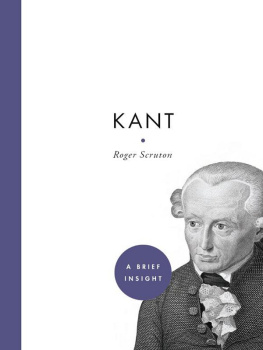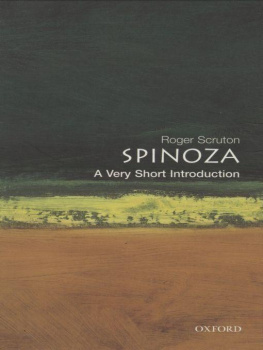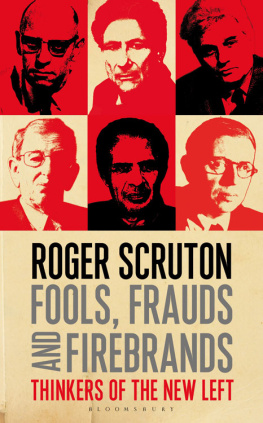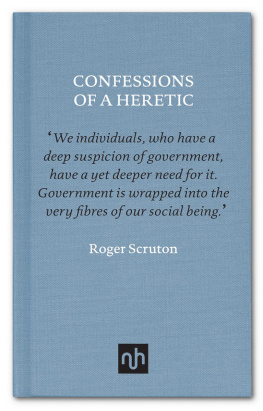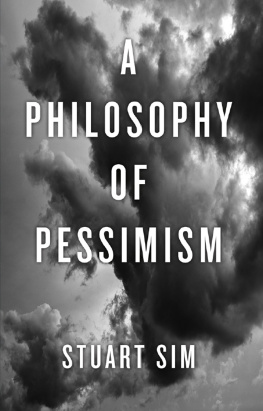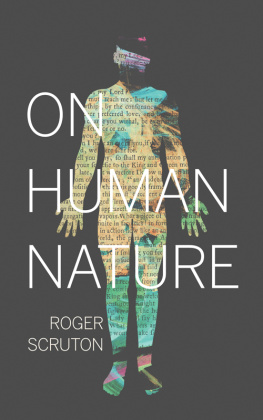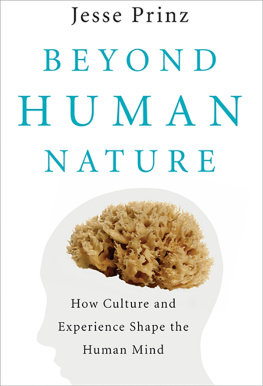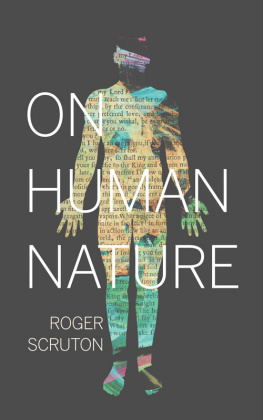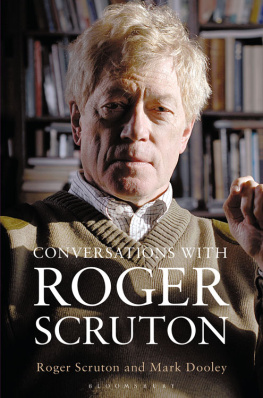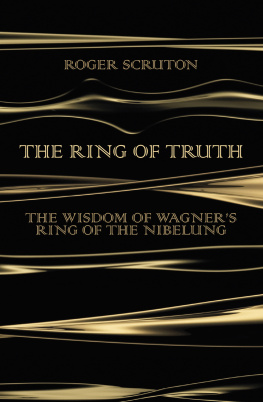THE USES OF PESSIMISM
THE USES OF
PESSIMISM
And the Danger of False Hope
Roger Scruton


Oxford University Press, Inc., publishes works that further
Oxford Universitys objective of excellence
in research, scholarship, and education.
Oxford New York
Auckland Cape Town Dar es Salaam Hong Kong Karachi
Kuala Lumpur Madrid Melbourne Mexico City Nairobi
New Delhi Shanghai Taipei Toronto
With offices in
Argentina Austria Brazil Chile Czech Republic France Greece
Guatemala Hungary Italy Japan Poland Portugal Singapore
South Korea Switzerland Thailand Turkey Ukraine Vietnam
Copyright 2010 by Roger Scruton
First published in hardback in Great Britain in 2010 by
Atlantic Books, an imprint of Grove Atlantic Ltd.
Published by Oxford University Press, Inc.
198 Madison Avenue, New York, NY 10016
www.oup.com
Oxford is a registered trademark of Oxford University Press
All rights reserved. No part of this publication may be reproduced,
stored in a retrieval system, or transmitted, in any form or by any means,
electronic, mechanical, photocopying, recording, or otherwise,
without the prior permission of Oxford University Press.
Library of Congress Cataloging-in-Publication Data
Scruton, Roger.
The uses of pessimism and the dangers of false hope / by Roger Scruton.
p. cm.
ISBN 978-0-19-974753-5
1. Pessimism. I. Title.
B1649.S2473U83 2010
149'.6dc22
2010016220
1 3 5 7 9 8 6 4 2
Printed in the United States of America
on acid-free paper
Contents
Preface
In this book I examine optimism in what Schopenhauer called its wicked or unscrupulous (bedenkenlos) form, and show the place of pessimism in restoring balance and wisdom to the conduct of human affairs. I dont go along with Schopenhauers comprehensive gloom, or with the philosophy of renunciation that he derived from it. I have no doubt that St Paul was right to recommend faith, hope and love (agape) as the virtues that order life to the greater good. But I have no doubt too that hope, detached from faith and untempered by the evidence of history, is a dangerous asset, and one that threatens not only those who embrace it, but all those within range of their illusions.
At first, the old myth tells us, the only mortals on earth were men, to whom Prometheus brought fire in defiance of Zeus. In revenge Zeus ordered the creation of the first woman, who was given in marriage to Prometheuss brother. Her name was Pandora the all-giving one. And as a wedding gift Zeus gave her a box, instructing her never to open it. Giving way to her curiosity at last, she opened the box, releasing into the world death, disease, despair, malice, old age, hatred, violence, war and all the other evils that we know. Pandora closed the box at once, and one gift remained inside the gift of hope: the only remedy, but also the final scourge.
My concern, in the first instance, is with certain fallacies that seem to justify hope, or at least to make disappointment bearable. My examples come from many areas, but they share a common characteristic, which is that they show, at the heart of the unscrupulous optimists vision, a mistake that is so blindingly obvious that only someone in the grip of self-deception could have overlooked it. It is against this self-deception that pessimism is directed. A study of the uses of pessimism will reveal a most interesting feature of human nature, which is that obvious errors are the hardest to rectify. They may involve mistakes of reasoning; but their cause lies deeper than reason, in emotional needs that will defend themselves with every weapon to hand rather than relinquish the comfort of their easily-won illusions. One of my purposes is to trace these emotional needs to their prehistoric source, and to show that civilization is always threatened from below, by patterns of belief and emotion that may once have been useful to our species, but that are useful no longer.
The belief that human beings can either foresee the future or control it to their own advantage ought not to have survived an attentive reading of the Iliad, still less of the Old Testament. The fact that it did so is a sober reminder that the argument of this book is entirely futile. You may enjoy it and agree with it, but it will have no influence whatsoever on those whom it calls to account. The irrationalities that I explore are, as the neuronerds put it, hard-wired in the human cortex, and not to be countered by anything so gentle as an argument.
The theme of the collective unreason of mankind is not new, and you might wonder whether there is anything to be added to the great survey that the Scottish poet Charles Mackay published in 1852, entitled Extraordinary Popular Delusions and the Madness of Crowds. Mackays study of prophecies, superstitions, witch-hunts and crusades is a grim reminder that all the things that he sardonically describes have continued in the same frequency and to worse effect since his book was published. Mackay felt that mankind had at last entered a period of scientific knowledge, in which crowds would allow themselves to be corrected by the experts whom previously they had preferred to burn at the stake. Nothing could have been further from the truth. The great crowd movements of communism, Nazism and fascism, in which false hopes were to transform themselves into marching armies, had yet to appear over the horizon. And the rise of the scientific expert did little more than rebrand the witch-hunts and genocides of the twentieth century as rational decisions, for which science had shown the need. The liquidation of the kulaks was justified by Marxist science, the racist doctrines of the Nazis were proposed as scientific eugenics, the Great Leap Forward of Mao Zedong was held to be no more than an application of the proven laws of history. Of course the science was phony; but that merely shows that, when unreason triumphs, it does so in the name of reason.
In a more recent study, Scared to Death, Christopher Booker and Richard North have examined the panics that have swept across the civilized world in the last two decades. These panics show the other side of unscrupulous optimism: the equally unscrupulous pessimism that comes when false hope is deflated. All of them from the hysterical belief that two million British people were about to die from the human variant of mad cow disease, to the apocalyptic vision of global warming, from the fear that all the worlds computers would shut down at the millennium, to the campaigns against lead in petrol and passive smoking have been presented as science. And all of them have ignored evidence and argument in favour of a preordained conclusion, accepted because it gives direction and force to a mass movement of the righteous, assembled to cast out the devil from our midst. Those who question or resist are singled out as scapegoats; witch-hunts of the sceptics go hand in hand with adoration of the heroes such as Al Gore who are pointing the way to salvation. And when the panic is over the crowd disperses, having achieved neither relief nor self-knowledge, but merely the readiness for another scare.
In two other recent studies How Mumbo-Jumbo Conquered the World by Francis Wheen, and Intellectual Impostures by Alan Sokal and Jean Bricmont indignant intellectuals have pointed to the ways in which nonsense has taken up residence in the heart of public debate and also in the academy. This nonsense is part of the huge fund of unreason on which the plans and schemes of the optimists draw for their vitality. Nonsense confiscates meaning. It thereby puts truth and falsehood, reason and unreason, light and darkness on an equal footing. It is a blow cast in defence of intellectual freedom, as the optimists construe it, namely the freedom to believe anything at all, provided you feel better for it.
Next page


